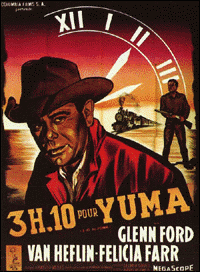 Before its underwhelming second half, Delmer Daves' classic western 3:10 to Yuma appears to be heading for that special cinematic designation of being About Everything. Early exposition concerns outlaw Ben Wade (Glenn Ford) and his posse's robbery of a stagecoach that results in the death of its driver. Standing by but unable to help for sheer lack of man or firepower is Dan Evans (Van Heflin), a local and honest rancher whose family is suffering from drought and seclusion. Luck, however, sees the local authorities able to arrest Ben Wade in a rare instance of his being alone, and tired of being unable to provide for his wife and two sons, Dan volunteers to help transport the convict to prison for the sterling payment of fifty dollars. Charles Lawton Jr.'s impeccable cinematography frames these characters as essentially lost beings in the existential wasteland of the desert, a series of graceful pans and tilts emphasizing the expansiveness of country in comparison to the meager human outcroppings, while Welles' screenplay touches on the desperation of these souls to live, love, and be loved with a profound sublimity.
Before its underwhelming second half, Delmer Daves' classic western 3:10 to Yuma appears to be heading for that special cinematic designation of being About Everything. Early exposition concerns outlaw Ben Wade (Glenn Ford) and his posse's robbery of a stagecoach that results in the death of its driver. Standing by but unable to help for sheer lack of man or firepower is Dan Evans (Van Heflin), a local and honest rancher whose family is suffering from drought and seclusion. Luck, however, sees the local authorities able to arrest Ben Wade in a rare instance of his being alone, and tired of being unable to provide for his wife and two sons, Dan volunteers to help transport the convict to prison for the sterling payment of fifty dollars. Charles Lawton Jr.'s impeccable cinematography frames these characters as essentially lost beings in the existential wasteland of the desert, a series of graceful pans and tilts emphasizing the expansiveness of country in comparison to the meager human outcroppings, while Welles' screenplay touches on the desperation of these souls to live, love, and be loved with a profound sublimity.Though nary a moment of the film strikes an unpleasant chord from beginning to end, the generally abrupt shift in tone from the first to the second half lessens the cohesiveness of the overall experience, abandoning the accruing potency of its spiritual undertones for a more streamlined and far less interesting action storyline. Dan's moral challenges in bringing a murderer to justice against overwhelming odds - so as to prove his existence as having been truly worth something - should signify his having overcome the desolation that has so long plagued his soul, and though his ultimate decision to act is a significant one to his character, the sense of purpose in his motives feels unnaturally mandated by external forces (namely, the screenwriter), betraying much of what has already transpired. Similarly, Ben Wade's character arc ultimately proves little more than a gimmicky, underdeveloped necessity to the final series of events; while Van Heflin's sympathetic performance is strong enough to largely mask over his character's inconsistencies, Glenn Ford's performance never goes beyond pandering to audiences who would have otherwise scoffed at his playing against type. Similarly, 3:10 to Yuma flirts with a deeper greatness, and though masterful in stretches, it ultimately mistakes feel-good qualities for truly satisfying ones.

No comments:
Post a Comment